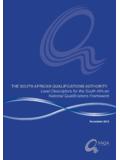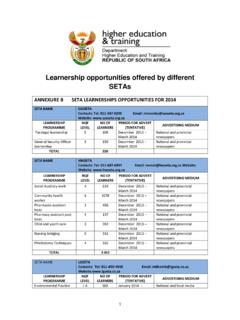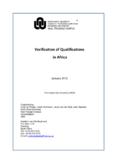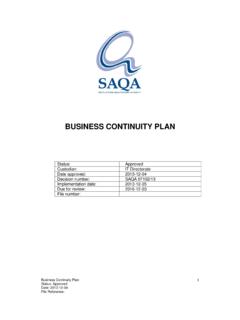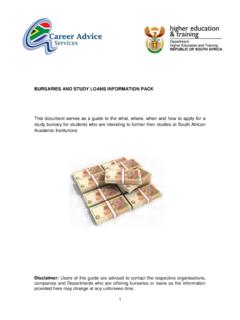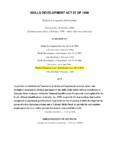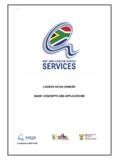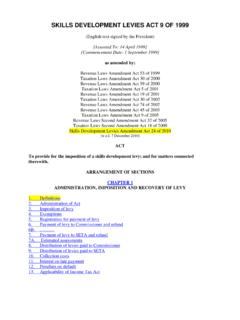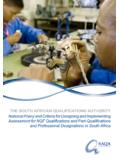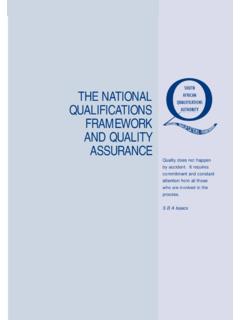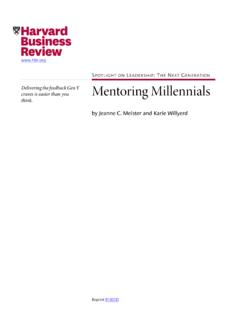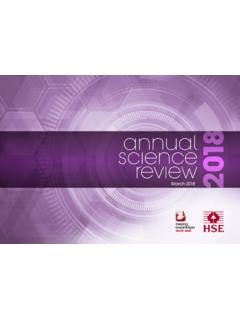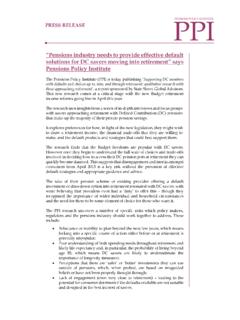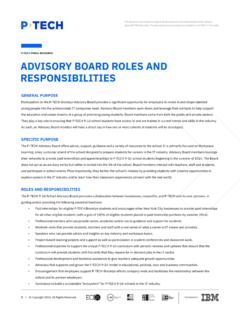Transcription of THE SOUTH AFRICAN QUALIFICATIONS AUTHORITY
1 THE SOUTH AFRICAN QUALIFICATIONS AUTHORITYN ational Policy for the Implementationof the Recognition of Prior Learning2013/RPLC over:RPL 8/13/13 11:54 AM Page 1 Compiled and produced by: The SOUTH AFRICAN QUALIFICATIONS AUTHORITY (SAQA).CopyrightAll rights reserved. No part of this publication may be reproduced, stored in a retrievalsystem or transmitted in any form or by any means, electronic, mechanical,photocopying, recording, or otherwise, without the prior written permission of SAQA. Publication date:March 2013 ISBN:978-1-920649-04-3 Postnet Suite 248 Private Bag X06 Waterkloof0145 Helpdesk:+27 (0) 86 010 3188 Facsimile:+27 (0) 12 431 8/13/13 11:54 AM Page Policy for the Implementation of the Recognition of Prior of of the Recognition of Prior Learning in SOUTH of Prior Learning in the context of the National QUALIFICATIONS Framework in SOUTH priorities for for the implementation of of of the SAQA RPL Reference :RPL 8/13/13 1.
2 45 PM Page 1 ForewordThe National QUALIFICATIONS Framework (NQF) Act 67 of 2008mandates the SOUTH AFRICAN QUALIFICATIONS AUTHORITY (SAQA) todevelop, after consultation with the Quality Councils, a nationalpolicy for the recognition of prior learning (RPL).This revised RPL policy is grounded in extensive stakeholderconsultation. SAQA initially developed the policy for RPL in 2002,and criteria and guidelines for RPL in 2003. Both of thesedocuments have been used widely and remain in use, but needto be updated to align the policies with the NQF Act 67 of 2008that replaced the SAQA Act 58 of 1995.
3 This revised RPL policy has been developed with support fromthe SAQA RPL Reference Group, which includes staffrepresentatives from the Quality Councils (a full list of membersof the Reference Group is provided at the end of the policy). Broader consultation with all nominees for the SAQA RPLR eference Group and organised labour also took place in theform of a workshop on 6 July 2012. The policy was madeavailable for public comment between 1 October and 15 November 2012 during which period substantial comments werereceived from all sectors of the education and training considering the advice of the RPL Reference Group, andafter consultation with the QCs, the policy was approved by theSAQA Board on 15 March 2013.
4 We trust that through this policy it will be possible to workcollectively towards demonstrably changing the lives of RPLcandidates, including workers and learners of all ages,unemployed people and other marginalised groups, as importantbeneficiaries of RPL services. Joe SamuelsChief Executive Officer2 Inners:RPL 8/13/13 1:45 PM Page 2 National Policy for the Implementation of theRecognition of Prior revised National Policy for the Implementation of Recognition of Prior Learning (RPL) provides for theimplementation of RPL within the context of the National QUALIFICATIONS Framework (NQF) Act 67 of 2008.
5 RPL Policy replaces the policy document Recognition of Prior Learning in the context of the SouthAfrican NQFdeveloped in 2002 by the SOUTH AFRICAN QUALIFICATIONS AUTHORITY (SAQA) within the Contextof the SAQA Act (Act 58 of 1995). Policy is located within the broader context of the Human Resource Development Strategy and theNational Skills Development Strategy, as well as a consideration of the National Development Plan 2030. Policy builds on the strengths of the Recognition of Prior Learning in the Context of the SouthAfrican NQFdeveloped by SAQA in 2002, as well as on new insights gained from on-going practiceand research.
6 It establishes the basic core principles and priorities for RPL as part of the furtherdevelopment and implementation of the NQF in SOUTH Africa. policy seeks to position RPL in relation to the overarching principles and priorities of the NQF inSouth implementation of this National RPL Policy will be achieved a comprehensive, quality-assured and resource-driven approach to optimise thedelivery of RPL services and programmes, including RPL quality assurance and benchmarking of RPL overseen by SAQA and the three QualityCouncils: the Council on Higher Education (CHE), Umalusi.
7 Council for Quality Assurance in Generaland Further Education and Training, and the Quality Council for Trades and Occupations (QCTO) that barriers to implementation, such as: limited incentives; lack of resources todevelop and sustain services at affordable prices; lack of trained RPL personnel; inadequatesupporting systems such as administrative systems that are unable to grant credits for partqualifications and admission systems without robust alternative access routes; and institutionalresistance and lack of capacity must be different kinds of RPL and purposes for RPL in relation to different contexts andclassifications of knowledge, skills, competencies, QUALIFICATIONS and part QUALIFICATIONS in thenational learning for national co-ordination to assist the Quality Councils, institutions of learning, andRPL practitioners to deal with barriers, accessing funding, building capacity, advocacy andmarketing, and expanding RPL provisioning in a comprehensive RPL system.
8 Objectives objectives of this National Policy for the implementation of RPL are to: for further development and implementation of RPL, including its resourcing, effectivedelivery and quality assurance3 Inners:RPL 8/13/13 1:46 PM Page shared understanding of RPL within a broader lifelong learning an expanded scope for a holistic model and approach to and enable the formulation of sector criteria and institutional RPL policies in line with thisNational the basis for national guidelines and priorities for implementing RPL, and for effectivemonitoring and evaluation of the practices against these potential candidates to attain recognition of the appropriate knowledge and skills requiredfor personal development and the employment the roles and functions of employers.
9 Public and private providers, and RPLpractitioners in the provision of RPL across the education and training the national coordination of RPL by SAQA that will focus on research, support, advocacyand the mainstreaming of revised RPL Policy provides for the role of SAQA in co-ordinating the development of RPL policiesand practices across all sub-frameworks of the NQF, in co-operation with the three Quality Councils,education institutions and skills development providers, workplaces and other assessment sites,recognised professional bodies, and RPL Policy applies Councils, education institutions and skills development providers, work places, recognisedprofessional bodies, RPL practitioners and RPL QUALIFICATIONS , part QUALIFICATIONS and professional designations registered on the NQF andoffered in SOUTH specific context of each Quality Council and its sub-framework must be considered in theinterpretation of this of terms10.
10 Advanced standing means the status granted to a learner for admission to studies at a higher levelthan the learner s prior formal studies would have allowed, including exemption where applicable. 11. Credit accumulation means the totalling of credits required to complete a qualification or a part Credit transfer means the vertical, horizontal or diagonal relocation of credits towards a qualificationor part qualification on the same or different level, usually between different programmes, departmentsor Credit accumulation and transfer (CAT)
